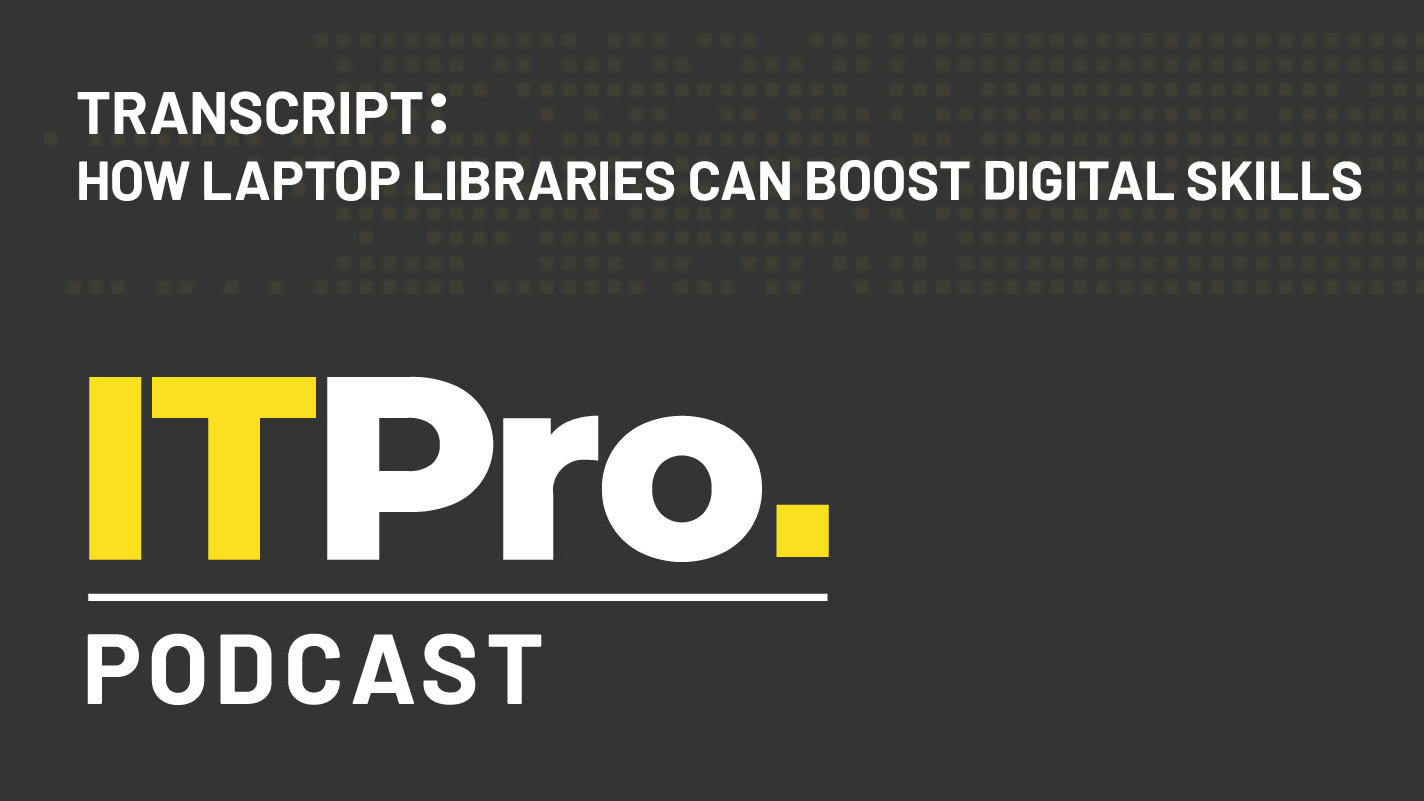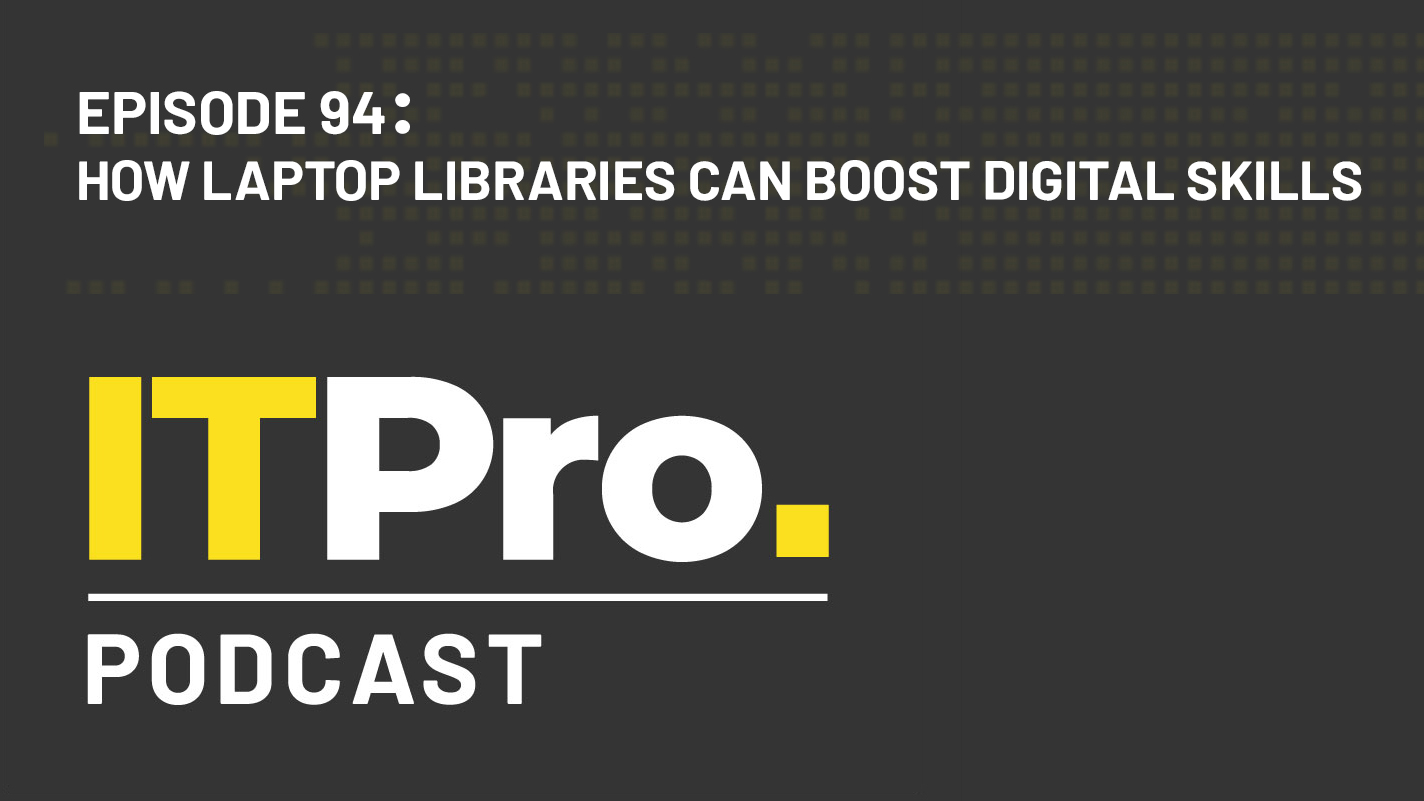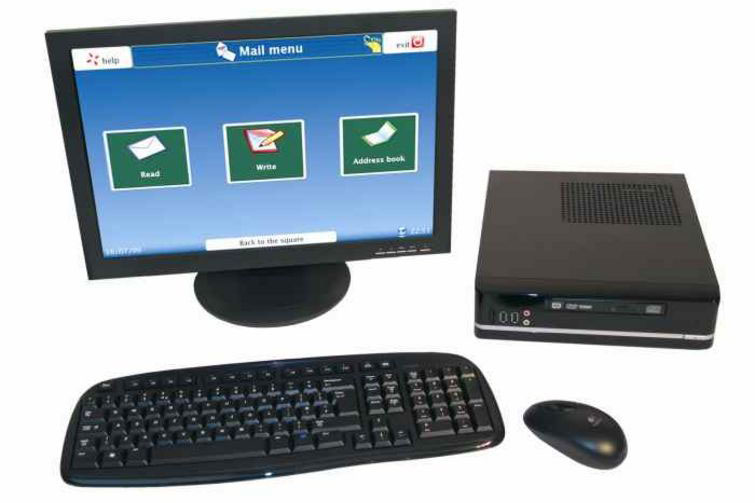
This automatically-generated transcript is taken from the IT Pro Podcast episode ‘How laptop libraries can boost digital skills’. To listen to the full episode, click here.
Jane McCallion
Hi, I'm Jane McCallion.
Adam Shepherd
And I'm Adam Shepherd.
Jane
And you're listening to the IT Pro Podcast where once again, we're talking about the digital divide.
Adam
A lack of access to technology can be a big problem, particularly for young people. If kids can't use a PC for things like schoolwork and job applications, they can end up being severely disadvantaged. That's why London based charity CC Foundation launched a laptop library programme allowing kids to borrow devices when they need them.
Jane
This initiative is supported by London MSP Totality Services. And we're joined today by Totality's co-founder Luis Navarro to discuss the UK's digital divide and how companies can help address the issue. Luis, welcome to the show.
Luis Navarro
Thank you very much for having me.
Sign up today and you will receive a free copy of our Future Focus 2025 report - the leading guidance on AI, cybersecurity and other IT challenges as per 700+ senior executives
Adam
So to kick off with, can you tell us a little bit about your work with CC Foundation?
Luis
Yeah, sure. So I mean, just to get started the CC Foundation, there's a lot more than just the laptop library. That's one facet of many things that they do. So the CC Foundation was created by Fekky. Fekky is a very well known rapper. So he's a collaborator of many famous musicians, other rappers as well. And his kind of goal with the CC Foundation is to help underprivileged kids in East London to begin with. So it's in Lewisham. He basically wants them, he wants to help them get ahead in life. So there's the, there's the laptop library. There's things in there like a music recording studio, a podcast recording studio, there's kind of mentors they've hired for mindfulness. So it's very broad in terms of what they do. So, so I was contacted by Fekky a few months ago. And he was telling me all about the foundation, all the good work that they're doing. And he actually mentioned a survey that took place a number of months ago, too. So it was a survey of 13,000 London based kids. And the key findings were kind of quite striking. So it basically showed that 84% of kids in London do not have a laptop or access to a laptop, and over 50% of the kids do not have access to internet. So given kind of our background as Totality Services and where we've come from as a business, it all kind of ties in very nicely. So we're quite a young MSP. So we officially started in 2008. In terms of the real growth, it's only happened in the last four years. Our first hires were really young people, okay, so, apprentices, you know, 16 to 18 years old. So it's those young, hungry apprentices that really got us off the ground and got us going, okay. And that's something that we still do now, we still hire lots of apprentices. We invest lots of money in apprentices, in traineeships, getting them up to speed, a lot of these kids don't really have IT skills. So you know, they've got great customer service skills, and we teach them the IT side of things. So that's one thing. And then as a business, we've always helped charities in quite a limited way. So we do lots of donations, we support a few charities free of charge. The CC Foundation, and when Fekky got in touch, and he gave me the results of that survey. It's right, what else can we really do to help kids in London, especially those who are underprivileged? So the laptop library is the first thing so we want to make sure kids in London have access to a laptop. So it's predicted that laptops that we've donated are going to be accessed by around 1000 kids over the summer, okay. That's going to be fantastic. So, in terms of kids catching up with schoolwork after what's happened this year, with the pandemic, and last year, that's going to be a fantastic opportunity to help kids get up to speed. For us, the donation of the laptops is probably the most simple thing that we can do. Okay, it costs us money. What I want to do and what Fekky and I were discussing is, how can we really add value to these kids. Because any company can can donate laptops, what we want to do is actually help these kids get ahead in life, too. So the laptops are the first stage that's been put in place, that was launched a couple of weeks ago. We have around 30 staff members, you know, really highly qualified engineers. So these engineers can actually go and sit down with these kids. And they can say, look, this is, I can teach you about IT security. I can teach about social media security, what to post, what not to post, give them those base rules. Things like apprentices as well. So we want to make sure you know, if these kids are interested, they can come into our office and actually see what the office environment is like; some of these kids would never have been in an office. So we want to give them the opportunity. And it's not just an IT helpdesk perspective. You know, we have staff members who work in marketing and strategy and finance. So it could be they take an interest in one of those areas. And we're more than happy to help from that aspect.
Jane
It sounds a bit from what you've just said, that it's, it's not just a question of access to the tools they need, you know, to laptops, although that's clearly, obviously an important first step. But digital literacy seems to be part of the, the problem, if you like, as well, is that, is that a fair assessment?
Luis
Correct. So and that's where our staff members can really help. So we're putting in a programme, sort of putting a programme in place, which is having our staff go in and actually spend time with the kids, whether it's group sessions, and show them look, this is a laptop, you know, there's Mac, there's Windows, there's also showing them the basic applications. So things like Word, you know, this is how you write a CV, helping kids get that first step onto the career ladder, you know, we can show them how to draft a CV. So it's gonna be very involved. And like I said, the easy thing is just to do a one off donation, we want to have an ongoing relationship, and really help these kids progress.
Adam
Yeah, I mean, it's that whole kind of give a man a fish, give a man a fishing rod question, you know, giving kids laptops and saying yeah, there's a laptop, off you go, go and, you know, develop IT skills is one thing; unless you give them the the background, and the foundational skills of why you would want to develop IT skills, you know, opening their eyes to some of the possibilities. And the, this is probably gonna sound a bit trite, but the joys of IT and the things you can do with it.
Jane
This isn't a podcast for joy about IT. This is a podcast for problems in IT!
Adam
So speaking of which we've spoken a bit about access to technology, and you know, some of the problems in that area - as someone who's worked directly, you know, with this issue, and with people who are kind of in the middle of it, what's the scale of the problem from your perspective?
Luis
Sure. So I think the scale of the problem is really... it's huge, especially in certain pockets of London and other pockets of the UK, obviously. So I think a lot of these kids, they're really lacking a role model. They're lacking the resources, they haven't really had the opportunity. I think that's the key thing, is to give these kids a chance. You know, I've got so much experience, lots of people in my business have got lots of experience. And we've got some fantastic case studies, there's a guy who works for us, Shane, I mean, he started with us four or five years ago, as a 16 year old, you know, very basic salary. You know, fast forward a couple of years. He's our most senior project engineer. He's only 22 years old. So what I mean, a part of this project for me is giving these kids exposure to people like Shane who can explain their journey and say, look, I started with very few GCSEs. I didn't go to college, I didn't go to university. But look, do you know what? Totality took me under their wing. They showed me the ropes. And now I've really progressed. And you know, he's, he's, he's such a happy kid. He wants to learn, he's hungry. And it's those kids that we really want to take from the CC Foundation. You know, like I said, show them our office, show them all the different facets of our business, and help them grow and be part of that journey with them.
Jane
I think that's really important, you know, kind of showing people who are from disadvantaged backgrounds that , you know, this is for you as well. You don't have to be somebody who has, you know, nine A-stars or - I'm showing my age because I think that, you know, this isn't how they're graded anymore - but you know, kind of whatever high flying GCSEs, that actually, you know, there are other ways in and this is for you as well.
Luis
Correct. I mean, even with myself, so I went to university, I was never an academic, I never really had any real interest in academia, I kind of just followed the path. You know, everyone says, Oh, you need to go do your A Levels and you go to university. I just did it because it's what everyone did. I'm not an academic, I would be much better off, you know, finishing school at 16. And going straight into work. And, you know, there's lots of kids like that. But there's lots of kids like that, who just don't have the chance because of their background.
Adam
And there's lots of kids, I would imagine, who don't even really know that that's an option. You know, I think a lot of people when you say kind of like apprenticeships, they think, you know, plumber, or maybe at a push, electrician. They, they don't think of, for want of a better word, kind of white collar jobs like IT. You know, they don't see that as a possible route. And in fact, we were talking on a recent episode, we were talking to Sam O'Rourke, who founded his own company when his apprenticeship fell through, but he was saying the same thing. You know, apprenticeships, particularly for IT, in his view, are a better route into the industry than a traditional kind of university degree.
Luis
Yes. So that, that really resonates with, with me, I think a lot of our staff members as well. IT, I mean, it's a very, very specific skill set. Once you learn an operating system or a software, you know that I mean, you can study about IT generally. But in terms of the day to day work, as an IT engineer, you're generally going to focus in on one specific area, network, servers, etc. You don't need a degree to work in IT, it's actually you know, if you're interested in tech, and you want to kind of, you know, if you're a hungry individual, and you want to get ahead, then it's a very kind of, I would say, not, not easy, but it's, it's some, it's quite a simple path to get into career-wise.
Adam
And I would actually argue that doing an IT based degree or a technology based degree, may even be counterproductive, because a degree course will last what, three, four years, look at the rate of change that we've currently got in the industry. If you are just graduating now, this year, then you look at, you know, where the industry was three, four years ago, there's a good chance, you may not even have been focusing on things like, you know, cloud technologies, and Azure and whatnot, you may still have been working with kind of more traditional databases and, and stuff like that. Kubernetes probably isn't going to factor in at all. Whereas if you're doing an apprenticeship or any kind of on the job learning, you can adapt and respond to these really rapid industry changes, as they happen, rather than, you know, learning this whole set of skills, and then effectively getting into the workplace and having to chuck a third of it in the bin, because nobody's using it anymore.
Jane
Amusingly, that's the opposite of what I was about to say.
Adam
Really?
Jane
Yeah, because a lot of computing, or computing type academic programmes, especially at ex-polys, involve a third year in industry. So you have got that little bit and it's not unknown for people who have done a placement with the company, if they've done well, to be asked to come on board straight away and maybe actually abandon the final year of their degree.
Adam
Oh, absolutely. But surely, by that logic, just cut out the middleman and go straight to the placement year.
Jane
I think it probably depends on the kind of person that you are.
Adam
True.
Luis
One thing to factor in as well is kind of the soft skills that you do gain at university. So yes, there are things that you can gain as an individual, which will help and make you more mature. When you go into the workplace, you know, things like doing a presentation in front of, you know, PhD lecturers and 500 people in your lecture hall, you will never get that at a secondary school. So I do think, you know, you shouldn't kind of just forget University, but like you said, I think the rate of change in IT is massive. And every time we've hired kind of a more senior engineer who has been to university, we would always start them at the same point, as if we were hiring an apprentice anyway, because, you know, we have a certain way of working, we have certain systems we use for documentation or our help desk platform. Most of our engineers are entry level, regardless of if they've got a degree or not, they will start as a first level engineer, and they'll have to work their way up. So we don't kind of judge on whether they've got a degree or not, we judge more on the person and that's where with us, age is not a factor. And that's, again, ties back to the CC Foundation. We want to bring these kids in, we want to help them.
Jane
So Luis, I have to ask, were you surprised to be contacted by Fekky in the first place?
Luis
Um, so I was really surprised and I'll tell you why I'm surprised; because I think IT support companies, MSPs generally, are kind of unsung heroes. I think through the pandemic, we've done a great job; we're never really mentioned, we're never in the spotlight. I was actually really happy I was contacted because we never usually get contacted like any, for anything like this because we're so under the radar. You know, you never go to a party and talk about oh, you know, I've got a fantastic MSP; it's never mentioned. The fact this guy, you know - who I then checked out on Instagram, he's got over 100,000 followers - had got in touch with us, I thought was pretty amazing. And like everything he said resonated with me 100%, you know, based on, you know, how we started the company. You know, hiring the young staff members, we help charities already; it was the perfect fusion.
Adam
Yeah, I think that's a really good point about MSPs and channel companies in general being really I think underappreciated in the industry. You know, MSPs, in, in a lot of ways are like toilet cleaners. They're doing their job if you never think about them. You don't notice them.
Luis
What an analogy, I've got to use that one again.
Jane
I bet you're flattered.
Luis
Yeah, 100%, I'll put the marigolds on, just give me a minute.
Adam
But yeah, it's an, it's an absolutely essential service that you never notice or think about until it's not there.
Luis
Yeah, correct. So like, with us in the pandemic, so we've got over 140 clients, we support over 3000 staff members, across the capital, we had to transition all those, all those users from working in office environments to working from home pretty much overnight, you know, it's, that was huge. And now we're having to do the, kind of the reverse. We weren't paidany extra, it's all kind of within our, within our fees our clients pay us. And that was a huge task. And most clients that appreciate it, but mainly just thinking, well, that's just the service, there's a lot of effort that goes into, you know, a huge transition like that.
Jane
Yeah.
Adam
So speaking of which, has the pandemic, you know, going back to what we were talking about, about, you know, access to technology and the digital divide and whatnot. How has the pandemic impacted kids from these disadvantaged backgrounds? We've mentioned the access to kind of learning and education, which is something we've written about on the site in the past, what, what impact does this whole shift have on them if they don't have access to these kind of tools?
Luis
So I mean, from an education point of view, it's quite simple, kids, a lot of kids missed out on a lot of school. So without access to that technology, they really couldn't keep up. And in schools nowadays everything is pretty much online. If you go to a school as a kid, Well, look, you'll get, there's a laptop that you can use. So obviously, transitioning to home where a lot of these kids won't have Wi-Fi, won't have internet, or they don't have a device. So they just end up, you know, watching Netflix all day, or, or what have you. So I think that's a, it was a real issue. And that's where with the CC Foundation, we can now really help and help them catch up.
Adam
Because, of course, the you know, it's one thing, being able to do homework and, you know, access information, and whatnot. But another really key aspect of it was the contact with educators and with teachers, you know, if all of the classes and all of the interaction is happening over, you know, video conferencing platforms, and you can't access that as a student, it means you end up missing out on a huge amount of contact time, which is absolutely key, you know, if you're missing 18 months worth of contact and support, essentially, from your teachers, they're going to have a really hard time identifying any kind of problems with your education and supporting you through those.
Luis
Yeah, I think also, you know, in terms of certain specific scenarios, you know, imagine a single mom through the pandemic, who doesn't have great financial resources. And a kid at home who can't study, doesn't have a laptop, he can't, you know, he's not interacting with his friends. I mean, there must have been some really, really difficult scenarios throughout the pandemic. So, that, that for me, it's, it's heartbreaking. And it's things like that, that, you know, if we can help in any little way, then we're going to do that. And that's again, you know, with the CC Foundation, this is a fantastic relationship. And it's, I think it's one that we're gonna definitely be investing in for the years to come.
Jane
It seems to me almost like there's a reflection between what you spoke about in `regard to your clients, and what happened to all the kids who were sent home suddenly that if this happened to one or even two people at a time, it would be manageable. If you had one client who was like, do you know what, we've decided offices are the thing of the past, can you help us move completely remotely - in normal times I imagine that would have been pretty easy to deal with. But because it happened to everyone, hundreds, thousands of people all in one go, yeah, that made it slightly more tricky.
Luis
Correct. I mean, from a client point of view, luckily, we're quite proactive as an MSP. So cloud first strategy, we had been kind of beating that drum with our clients for a number of, for a number of years. One, so my, my fellow co founder, Pedro, he, he works from Iceland. He's been working from Iceland for four or five years. So he kind of, so he's always been saying, Look, guys, you can work from home, you can work remotely. With our team, we've always said look, you can work from anywhere. If you want to work from Australia, do that. Obviously log on on time, finish on time, do your job properly, it doesn't matter. So we've always been kind of ahead ahead of the curve when it comes to those things. And with our clients, we've always tried to do the same. And obviously, there's some sectors where you do need, you do need physical kit in the office, you do servers, NAS devices, etc. But where it's possible, especially in lots of service based industries, financial institutions, etc, you can be cloud first very easily. And we always kind of push them to adopt that strategy.
Adam
So you've been running this programme in collaboration with CC Foundation for a few months now. Correct?
Luis
Correct. Absolutely. Yeah.
Adam
What impact has it had on the, on the kids so far?
Luis
So all the feedback we've had so far, has been really, really positive. So I know, the kids are kind of, there's kind of different levels of kind of expertise. So there's been a few sessions now where kids have actually learned, you know, how to even how to switch the laptop on, you know, how to type. So it's really kind of basic level.
Adam
Really?
Luis
Yeah, absolutely.
Adam
I'm surprised that the inherent level of you know, to use a slightly overexposed term, digital nativeness, or digital nativity, I guess.
Jane
[Retching noises] That's, that's my feelings on the matter.
Adam
OK, so Jane's not a fan. But I'm surprised that the level of digital familiarity isn't kind of just inherently higher, you know, given these people, these kind of, these kids have grown up around technology.
Luis
So they have, I mean, look, it's interesting. So some of the kids, you give them the phone, and they can type really quickly. But you give them a laptop, and it's literally, you know, finger finger, you know, searching around, the full stop, you know, where is everything, all that kind of stuff, it's more that kind of level. And then so, you know, kids who are a little bit older, they're a bit more familiar. And it's more a case of, you know, showing them those skills, you know, using Word, using Excel, it's a very simple formula. Yeah, and it's opening their eyes to, you know, for in our eyes, probably quite simple things. But for them, you know, it's kind of it's a new world for them. And we're so happy we can be part of that journey.
Adam
Mmm, it's a, it's an interesting idea, because I sort of get that cause if you put a typewriter in front of me, for example, I suspect I would struggle quite significantly, with with kind of some of the, the fairly basic mechanical processes, you know, I can, I can type I'd like to think pretty well, yeah. But taking that kind of almost that step back compared to what I'm used to, to use a slightly older technology, I think would really tripp me up. So I can I can see how it would be the same for a generation who's grown up predominantly with, as you say, kind of phones and tablets rather than traditional laptops.
Luis
Absolutely. I've literally just changed my keyboard. So I used to have kind of a wired-in keyboard and I got a wireless one. And it's, so this keyboard's low profile. So I was used to typing a certain way. I didn't have to look on my keyboard. When you change keyboard - trust me, you need to start looking at the keys again, familiarising yourself with keys. I think it's really that kind of shift.
Adam
Yeah, absolutely.
Jane
I can tell you, Adam, if you started using a typewriter, you'd soon find out that the way that you actually hold your hands, presumably like this, and for the audience, who can't see how I'm holding my hands, it's quite flat...
Adam
I can't see how you're holding your hands.
Jane
Like this, quite flat, you'd need to do that. That's, which is like kind of far more upright in order to strike the keys hard enough. I can use a typewriter.
Luis
You're like Frankenstein doing that.
Adam
So Luis, aside from the fact that it's, you know, a good thing to do from a moral perspective, are there any other reasons why IT companies should consider getting involved with projects like this?
Luis
Well, I think from a pure selfish business point of view, there's lots of hidden gems out there. And I think most companies and IT companies included, we go down that traditional route of 'Okay, let's use LinkedIn to find staff. Let's use recruitment agencies'. By taking this different approach, you can get, you know, guys, kids who are so hungry, they want to develop, they want to learn, you know, you don't pay any recruitment charges. They're really willing to learn. They want to engage, they want to take things to that next level. And that's how we can help them.
Jane
Well, unfortunately, that's all we have time for this week. But thank you once again to Luis for joining us.
Adam
You can find links to all of the topics we've spoken about today in the show notes, and even more on our website, itpro.co.uk.
Jane
You can also follow us on Twitter where we're @ITPro, as well as Facebook, LinkedIn, and YouTube.
Adam
Don't forget to subscribe to the IT Pro Podcast wherever you find podcasts and never miss an episode. And if you're enjoying the show, leave us a rating and a review. We'll be back next week with more analysis from the world of IT. But until then, Goodbye
Jane
Bye.
ITPro is a global business technology website providing the latest news, analysis, and business insight for IT decision-makers. Whether it's cyber security, cloud computing, IT infrastructure, or business strategy, we aim to equip leaders with the data they need to make informed IT investments.
For regular updates delivered to your inbox and social feeds, be sure to sign up to our daily newsletter and follow on us LinkedIn and Twitter.
-
 The modern workplace: Standardizing collaboration for the enterprise IT leader
The modern workplace: Standardizing collaboration for the enterprise IT leaderHow Barco ClickShare Hub is redefining the meeting room
-
 Interim CISA chief uploaded sensitive documents to a public version of ChatGPT
Interim CISA chief uploaded sensitive documents to a public version of ChatGPTNews The incident at CISA raises yet more concerns about the rise of ‘shadow AI’ and data protection risks
-
 Intel, Barclays to provide laptops to UK teachers unable to access the Internet
Intel, Barclays to provide laptops to UK teachers unable to access the InternetNews The initiative aims to help teachers of more than 20,000 UK schoolchildren overcome inadequate online access
-
 Cornwall Council to lend laptops to the homeless
Cornwall Council to lend laptops to the homelessNews Partnership with the St Petrocs charity launches initiative to tackle the digital divide
-
 The IT Pro Podcast: How laptop libraries can boost digital skills
The IT Pro Podcast: How laptop libraries can boost digital skillsIT Pro Podcast Young people need access to devices if they’re to develop crucial digital skills
-
 Can private companies help solve the COVID laptop crisis?
Can private companies help solve the COVID laptop crisis?In-depth IT departments in the private sector could help bridge the digital divide, both now and as we emerge from the current crisis
-
 Older people get their own simple computer
Older people get their own simple computerNews The SimplicITy line was designed to help older people get to grips with computing.

